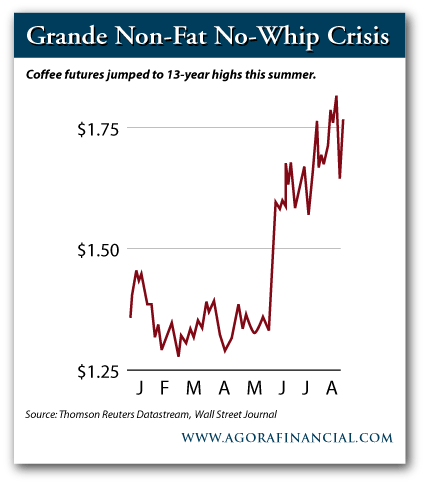Today's report begins with an abominable horror: The world's most valuable commodity has soared to its highest price in a generation. Coffee futures are approaching a 13-year high of $1.88 today. The case for more expensive coffee is growing stronger every week: Colombia had a smaller-than-normal harvest last year, and dry conditions in Brazil this year have pinched supply even tighter. Demand for this delicious, addictive stimulant is (naturally) growing.
Stockpiles at Intercontinental Exchange-certified warehouses are down 35% this year and swill makers like Maxwell House and Folgers have already raised prices by 9% and 10%, respectively. Starbucks announced recently that it will eat the costs, which will amount to roughly 4 cents a share. Retail prices would have to rise a whole lot more than 10% for us to even consider switching to something as silly as tea. Food prices are about to get a huge boost, too, but not in what we'd like to think of as a productive way. "Brazil screwed it all up," Chris Mayer, editor of Mayer's Special Situations, laments by way of giving us an explanation. Last week, the Brazilian government let loose a sudden, "immediately binding" mandate that effectively outlawed all foreign ownership of domestic farmland, eerily similar to the Zimbabwean farmland coup. "Worse," Chris continues, "the legal rules are so unclear that all such acquisitions since 1988 could be null and void, with the land returned to nationals. I can tell you from talking to people down there in the last few days, including attorneys, that local businesspeople are not dismissing that possibility. "Blame politics. It is an election year in Brazil. The country will vote for a new president on Oct. 3. All indications are that it will be Dilma Rousseff. She is one of the ones who have been highly critical of foreigners buying Brazilian land. 'Brazilian land for Brazilians' is the chant." What a boondoggle. In April alone, the latest data available, foreign investment in Brazilian agriculture was $26 million, up 225% from a year ago. Between 2002-2008, foreign investors poured nearly $2.5 billion into land alone. Plus there are some public funds that probably won't go forward now. Agrifirma raised $189 million and planned an IPO. Macquarie has a fund they set up, and they were to raise as much as $600 million. "The new rules will freeze agricultural investment in Brazil," adds Chris. "This is big news for global food markets because Brazil was such a key part of the equation. Brazil, as I've pointed out, is the world's arable land bank. This is where we'd get the added food supply the world needs. "The implications will echo far beyond the borders of Brazil. It will have an impact on the world's future food supply and on food prices. And it also raises broader questions about investing in Brazil at all." Safe Harbor Statement: Some forward looking statements on projections, estimates, expectations & outlook are included to enable a better comprehension of the Company prospects. Actual results may, however, differ materially from those stated on account of factors such as changes in government regulations, tax regimes, economic developments within India and the countries within which the Company conducts its business, exchange rate and interest rate movements, impact of competing products and their pricing, product demand and supply constraints. Nothing in this article is, or should be construed as, investment advice. |
http://in.groups.yahoo.com/group/investwise/
INVESTMENTS IN INDIA
We are low-risk, long-term investors.
Stocks, mutual funds and the entire investment gamut. Only financing/investment avenues in India will be discussed.
For any assistance, questions or improvement ideas, contact investwise-owner@yahoogroups.co.in
****************************************************************
NEW! ==== Check our LINKS and FILES sections for a world of information. REGULARLY UPDATED.
NEW! ==== Check "Tracklist" in Links and Files sections for Investment Ideas.
****************************************************************



